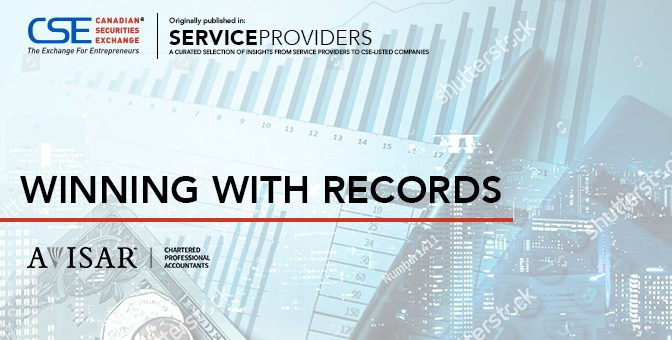BENEFICIAL RECORDS
Accurate financial record keeping is the bedrock of a well-functioning business. Though some companies survive in spite of their bookkeeping inefficiencies, in most cases, poor record keeping hinders progress and affects the company’s bottom line. The benefits of superior record keeping cannot be understated.
Working Capital Management
Cash is king and good financial records are essential to strong cash management procedures.
Quick collection of accounts receivable ensures that funds flow consistently into the bank account.
Collection efforts are futile however if the financial records are incomplete and the amount and aging of receivables is incorrect.
The flip side is the management of accounts payable. Up-to-date records provide companies with a snapshot of the amount owing and how long it has been outstanding. Vendors are less willing to extend credit to businesses with a history of late or irregular payments. Credit with vendors is critical for businesses to succeed.
Even profitable companies can easily find themselves in a negative cash flow situation. Reasons for poor working capital management are plentiful: lack of credit from suppliers, substandard collection of
accounts receivable, or obsolete inventory, among others, all of which could be eliminated by maintaining proper financial records.
Price Point
Accurate financial records enable management to analyze their cost structure. Companies need a firm understanding of their underlying costs in order to price their products appropriately and attain their desired profitability. Growing businesses could have multiple product offerings and the inability to determine ideal prices for each offering will reduce the bottom line.
Financing Alternatives
Any investor, bank or business partner will require a review of the financial records before investing in an entity. Maintaining accurate financial records demonstrates sound business practices and clearly details profitability which expediates external funding.
Growth
Management can generate and analyze various reports from sound financial records in order to assess the overall health of their enterprise and plan for the future. Leadership can evaluate the stress of any desired capital spending, which positions them to capitalize on opportunities and stay ahead of the competition. Otherwise, as they say about opportunity, ‘If you don’t take it, someone else will’.
Business Valuation
Company leaders endeavor to increase the valuation of businesses for shareholders. Thorough financial records are foundational to all approaches of business valuation, whether asset-based, earnings or even market value; they allow companies to calculate their worth.
Compliance
Publicly listed companies have strict financial reporting requirements and their ability to produce accurate
and timely accounting data is key to such compliance. Besides imposing monetary penalties, the Securities Commissions can subject companies to cease trade orders for delinquent filings. The Chief Executive and Financial Officers are required to certify their company’s disclosure controls and internal controls over financial reporting, the foundation of which is a clean set of basic accounting records.
Companies must also adhere to the deadlines imposed by their taxation authorities, i.e. the filing of annual tax returns, GST/HST returns, etc. Up-to-date financial records ensure timely compliance of such demands. Failure to file on time can be very costly to a business.
Audit Efficiencies
Publicly listed entities undergo an annual audit of their financial statements. All reports that are the subject of the audit are products of the underlying accounting records. Maintaining proper records allow for smoother audits, resulting in timely filings. Accurate financial records also facilitate ‘efficient’ audits since
required information can be seamlessly provided to the auditors, lowering the overall cost of such services.
All in all, accurate and timely financial record keeping is essential for the day-to-day operations of businesses and allow for intelligent decision making by leadership for growth or potential sale.
This story was featured in the Service Providers magazine.
Learn more about Avisar at http://avisar.ca/ and on the CSE website at http://thecse.com/en/services/services-for-listed-companies/avisar.


